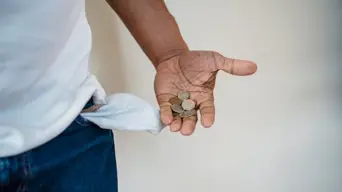Stuff happens: How to create an 'emergency fund'
There are two types of emergencies that might shock you into using an emergency fund: 'spending' and 'income' shocks. Here's what it's all about.

Short of money, coins taken from pocket. Pexels/Nicola Barts
CapeTalk's Lester Kiewit speaks to Chris Coetzee, CEO of FinFix.
Listen below:
Do you have money set aside for emergencies?
Financial advisors say that a good rule of thumb to apply in order to be financially safe is to set aside three to six months' worth of living expenses.
Coetzee says two types of emergencies might shock you into using an emergency fund: spending and income shocks.
The distinction between spending and income shocks would be:
- Spending shock: things like replacing a flat tyre, a broken fridge, or an unforeseen expense.
- Income shock: a loss of income, maternity leave, and retrenchment.
If you have an emergency fund, it means you're able to absorb the cost of spending or income shocks without taking debt to get through them.
A one-month emergency fund will generally only absorb spending shocks, while income shocks might need an emergency fund covering three to six months' pay.
"There will be spending shocks when consumers go through the month, if enough time passes, something will go wrong... and if you don't have an emergency fund, you will have to sell something or apply for debt, which will be costly in the long run."
- Chris Coetzee, CEO - FinFix
".... unemployment in our country is high, so if you want to absorb an income shock, you'll need to save up at least three to six months of your monthly income to ensure that if you lose your job, it gives you enough time to look for another job and those funds will carry you through that period."
- Chris Coetzee, CEO - FinFix
"... if you do your due diligence, there are expenses in your budget that are not necessary and that you can cut and allocate towards a savings plan. Our banking industry in South Africa is wonderful... There are small ways consumers that are struggling to save; some banking apps allow you to save your change, which goes a long way every time you swipe your card... You don't touch that savings plan, and over time that money will accumulate and you will have enough funds available to pay for those shock expenses..."
- Chris Coetzee, CEO - FinFix
"When it comes to inflation and consumer price increases, consumers will need to be more diligent when shopping around and make sure they get the best price so that they don't pay more than they have to."
- Chris Coetzee, CEO - FinFix
Scroll up to the audio player to listen to the full conversation.